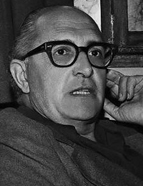

In other words, converting the previous sentences into questions, what does it mean to be in the world? What is man’s mission towards himself and towards others? The short story “Defesa e Justificação de um Ex-Criminoso de Guerra” [Defence and Justification of a Former War Prisoner] included in Novas Andanças do Demónio [ The Devil’s New Wanderings] (1966), is pivotal to understanding Jorge de Sena’s reasoning. Although his inspiration came from Adolf Eichmann’s trial, in this short story no direct reference is made to the crimes committed by the Nazi officer or to the concentration camp massacres. What the writer offers the reader are his thoughts on the human condition. Sena follows the line of thought explored in “Maquiavel e O Príncipe” [“Machiavel and The Prince”] to argue that, bereft of divine protection and as his own sole measure, for better or worse, man is left to fend for himself and is therefore responsible for all his actions (Maquiavel e Outros Estudos [Machiavel and Other Studies], p. 48). This former war criminal, however, does not pursue any humanist ideal, basing himself instead on “German ethics”, believing that, with effort and planning, some peoples will survive and conquer rival nations. For that reason, Nazi mentality and its beliefs in biological determinism and racial supremacy clash with the belief that man is accountable for his actions. (Monteiro, “Jorge de Sena’s “Eichmann Story”, p. 13). Sena seeks to understand the mind of someone who, as observed by philosopher Hannah Arendt in Eichmann in Jerusalem (1963), believed in the superior law of the Führer, above merely encouraging repugnance towards Naziism What this short story conveys is a view of freedom that contrasts with that of the author, namely a democratic freedom, of full accountability of the individual as far as intruding the space of others is concerned, as noted above. (O Reino da Estupidez-I, p. 134).
In a totally different register, Sinais de Fogo[Signs of Fire], a project conceived as the first volume of a major cycle of novels, even though it was only published posthumously (1979), addresses the theme of the Spanish Civil War and how this conflict was viewed in Portugal. Jorge, the main character, is a young man reporting on his adolescence, first in Lisbon and then in Figueira da Foz; his narrative is very important from a historical point of view in sofar as it provides in-depth knowledge of what life in summer was like in Figueira da Foz, a town associated with the presence of Spaniards who, in 1936, were refugees rather than tourists. However, to say that this book solely addresses the reactions to the outbreak of the Spanish conflict would be to oversimplify the meaning of Sinais de Fogo.
